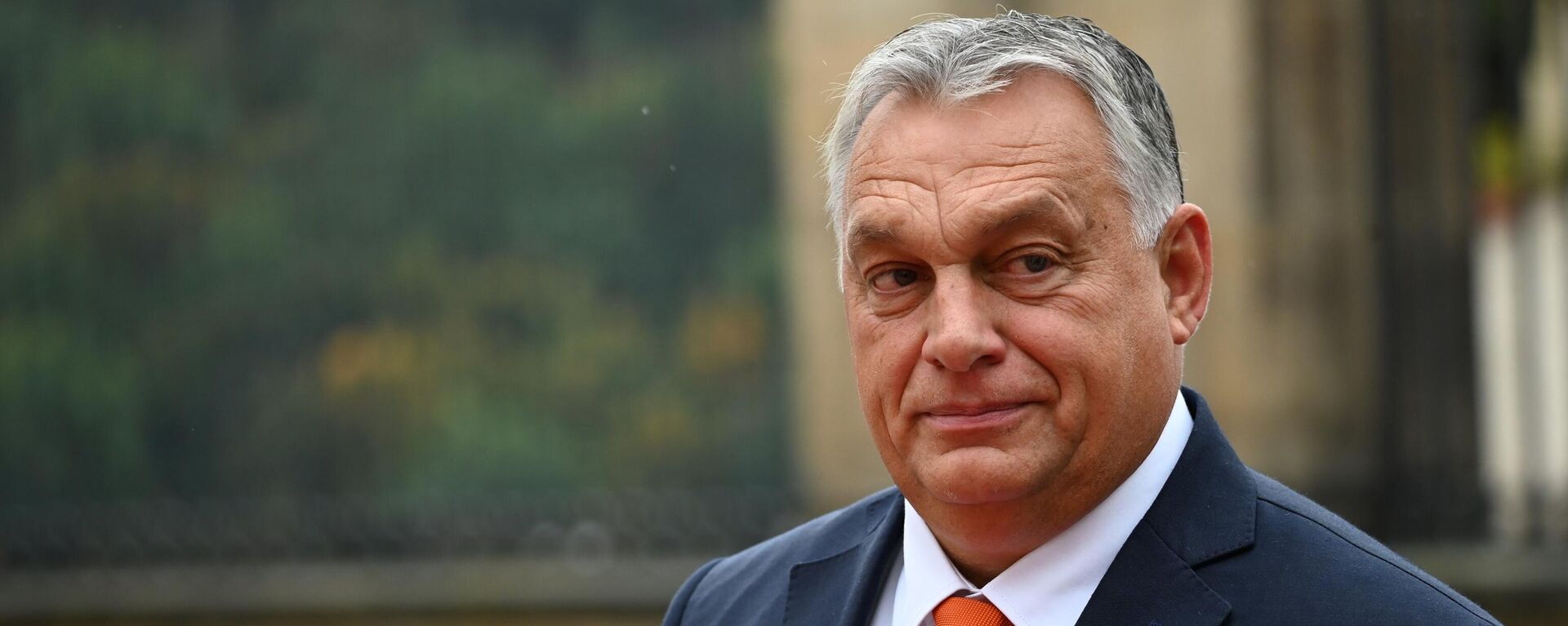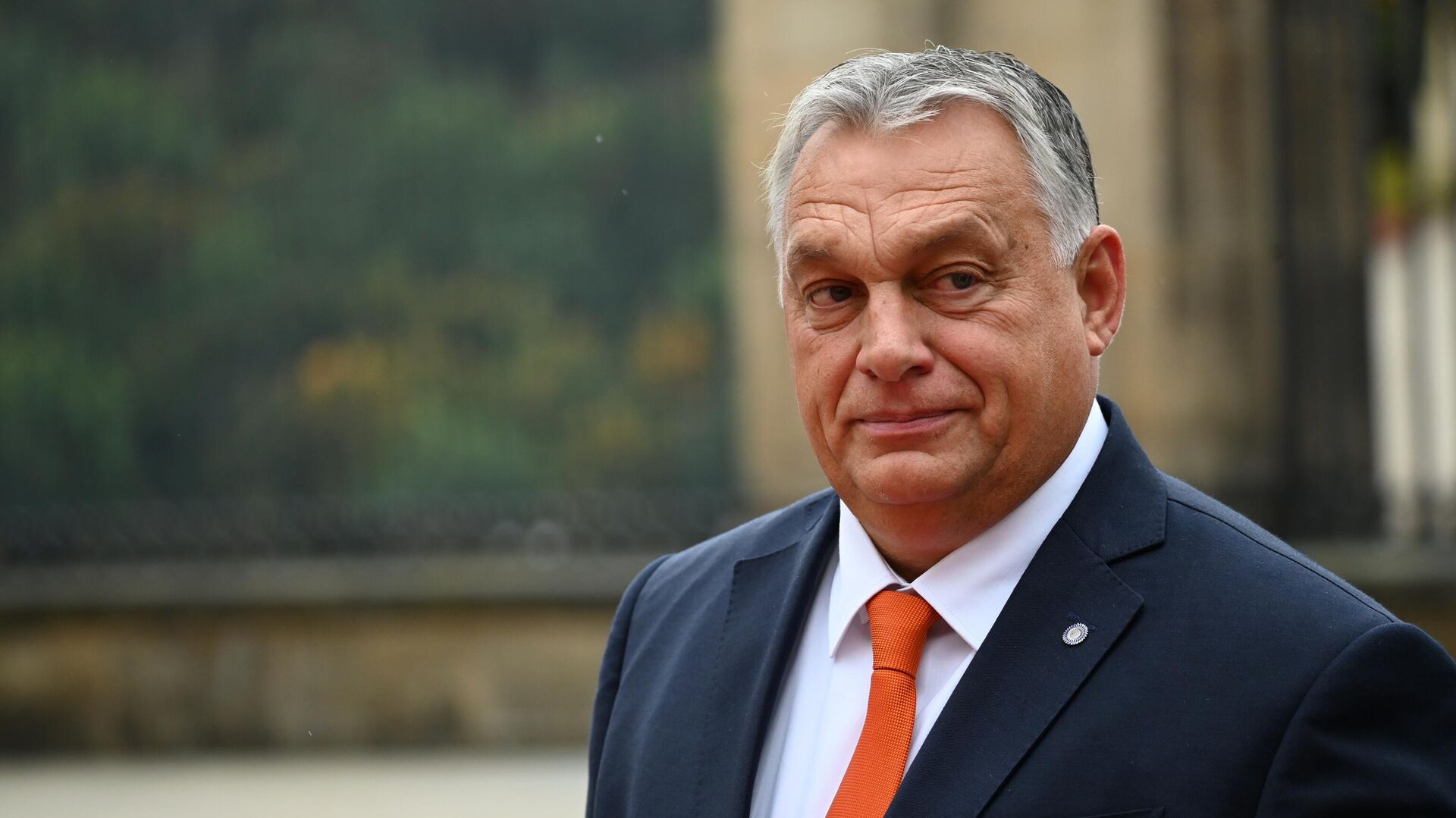https://sputnikglobe.com/20240131/hungary-being-punished-for-being-right-as-eu-eyes-sabotage-over-blocked-ukraine-aid-1116522560.html
Hungary Being ‘Punished for Being Right’ as EU Eyes ‘Sabotage’ Over Blocked Ukraine Aid
Hungary Being ‘Punished for Being Right’ as EU Eyes ‘Sabotage’ Over Blocked Ukraine Aid
Sputnik International
Dr. George Szamuely explained to Radio Sputnik how Hungary PM Viktor Orban's stance on the Ukraine war, while correct, is the impetus that has caused the European Union to turn against this country.
2024-01-31T22:16+0000
2024-01-31T22:16+0000
2024-01-31T22:16+0000
analysis
ukraine
russia
hungary
european union (eu)
global policy institute (gpi)
george szamuely
viktor orban
nato
europe
https://cdn1.img.sputnikglobe.com/img/07e7/0a/06/1113987388_0:0:3078:1731_1920x0_80_0_0_b2ee7ff55c0c7c5036cef4cd3d66a1a4.jpg
Dr. George Szamuely, a senior research fellow at the Global Policy Institute and the author of “Bombs for Peace: NATO’s Humanitarian War on Yugoslavia,” told Sputnik’s Fault Lines that Hungary is being punished for being correct about the conflict in Ukraine.While Szamuely says the EU certainly has the ability to significantly harm Hungary’s economy, that has been blunted somewhat by actions Orban has already taken.However, Szamuely admitted that Hungary still depends somewhat on European investment, particularly from Germany. “That might certainly hurt Hungary, but again, there’s a reason why Orban keeps traveling around the world, particularly in Asia. He does it precisely in order to anticipate what the Europeans might do to him,” Szamuely speculated.Szamuely said the plan’s objective is to “make the Hungarian economy scream,” but noted there are alternatives for European countries if they really want to fund Ukraine.“If [leaders] were to go to the French Parliament to say, 'We want to send another €10, €20 billion to Ukraine.' How would the farmers react? They would say, 'You gotta be kidding. Are you insane? You don't have money for us but you have money for Ukraine?’”Farmer protests that shut down French highways around Paris have since spread to Germany, Spain and Italy, among other countries. Demonstrations have been held against a reduction in subsidies and skyrocketing fuel costs the working-class is not able to meet.Asked about Hungary's response to the EU’s attempts to force Orban into approving aid to Ukraine, Szamuely suggested Hungary may eventually follow the UK’s lead in leaving the European bloc.“The EU continues to follow policies that Hungary obviously objects to, its foreign policy, its policy towards Russia, its policy on Ukraine. … [the] EU [is] flagrantly interfering in Hungary's domestic affairs on how it selects its judges, how it conducts its education policy, its social policy,” Szamuely detailed.The senior research fellow further explained that Orban has always said Ukraine cannot win in its conflict with Russia no matter how much Western countries pour into it.“Therefore, this €50 billion, how long is that gonna last? That's going to last three months, through to about Easter,” Szamuely estimated. “Then [Ukraine has] to come back for another €50 billion. So it's like an alcoholic, he's had his fix and now he wants another drink.”But Orban’s assessment, which appears more correct with every passing day, will not stop the EU from pushing for endless funds to be sent down the Ukrainian black hole.In the end, Szamuely warned that EU countries will have to address the concerns of their people or face dire consequences.“Anyone who knows about French history, Russian history, knows when [farmers] get angry, then terrible things happen. And that's what's going on now.”
https://sputnikglobe.com/20240131/brussels-softens-demands-vis-a-vis-hungarys-orban-in-bid-to-move-forward-with-50bln-in-ukraine-aid-1116521617.html
ukraine
russia
hungary
Sputnik International
feedback@sputniknews.com
+74956456601
MIA „Rossiya Segodnya“
2024
News
en_EN
Sputnik International
feedback@sputniknews.com
+74956456601
MIA „Rossiya Segodnya“
Sputnik International
feedback@sputniknews.com
+74956456601
MIA „Rossiya Segodnya“
hungary stance on ukraine, european union aid to ukraine, eu and viktor orban, eu sabotaging hungary, eu blackmails hungary
hungary stance on ukraine, european union aid to ukraine, eu and viktor orban, eu sabotaging hungary, eu blackmails hungary
Hungary Being ‘Punished for Being Right’ as EU Eyes ‘Sabotage’ Over Blocked Ukraine Aid
According to a report in US media, the European Union is considering a plan to harm Hungary’s economy in order to pressure it to allow the transfer of EU funds to Ukraine. Hungarian Prime Minister Viktor Orban has been a consistent opponent of Western sanctions on Russia, and has vowed to block using EU funds to provide weapons to the Kiev regime.
Dr. George Szamuely, a senior research fellow at the Global Policy Institute and the author of “Bombs for Peace: NATO’s Humanitarian War on Yugoslavia,” told
Sputnik’s Fault Lines that Hungary is being punished for being correct about the conflict in Ukraine.
“No one ever gets punished for being wrong. You only get punished for being right,” Szamuely explained, noting that Hungary’s position on Ukraine “has been nothing if not consistent from the beginning.”
After the EU earlier threatened to remove Hungary’s voting power - all votes in the EU must be unanimous, Slovakia defended Hungary, vowing to prevent any attempts to remove Budapest’s voting rights. The turn of events has since led to an alleged plan by the EU to destroy the Hungarian economy, a plot that was leaked to the media and published on Sunday.
The focus of the drama is a €50 billion funding package intended to prop up the Kiev regime through 2027, and which Orban blocked. Over 100 of the European Parliament’s members signed onto a letter urging for pressure to be placed on Hungary.
While Szamuely says the EU certainly has the ability to significantly harm Hungary’s economy, that has been blunted somewhat by actions Orban has already taken.
“[Orban] has managed to make the Hungarian economy much less dependent on others, particularly Europe,” Szamuely detailed. “For instance, he's brought much of the Hungarian finance under his own personal control. Therefore, the Europeans are not really able to bring the Hungarian financial markets into turmoil. He's made himself much more available for investment from China, from Russia, from other parts of the world. So he's not so dependent on investment from Europe.”
However, Szamuely admitted that Hungary still depends somewhat on European investment, particularly from Germany. “That might certainly hurt Hungary, but again, there’s a reason why Orban keeps traveling around the world, particularly in Asia. He does it precisely in order to anticipate what the Europeans might do to him,” Szamuely speculated.
Szamuely said the plan’s objective is to “make the Hungarian economy scream,” but noted there are alternatives for European countries if they really want to fund Ukraine.
“No one is stopping individual EU states from handing over funds to Ukraine… What they want to do is make this a kind of collective fund so that everybody, every single member of the EU is responsible for pissing away all this money,” Szamuely remarked, pointing to the worker and farmer protests in Germany and France as evidence their populations would not stand for it.
“If [leaders] were to go to the French Parliament to say, 'We want to send another €10, €20 billion to Ukraine.' How would the farmers react? They would say, 'You gotta be kidding. Are you insane? You don't have money for us but you have money for Ukraine?’”
Farmer protests that
shut down French highways around Paris have since spread to Germany, Spain and Italy, among other countries. Demonstrations have been held against a reduction in subsidies and skyrocketing fuel costs the working-class is not able to meet.

31 January 2024, 19:13 GMT
Asked about Hungary's response to the EU’s attempts to force Orban into approving aid to Ukraine, Szamuely suggested Hungary may eventually follow the UK’s lead in leaving the European bloc.
“The EU continues to follow policies that Hungary obviously objects to, its foreign policy, its policy towards Russia, its policy on Ukraine. … [the] EU [is] flagrantly interfering in Hungary's domestic affairs on how it selects its judges, how it conducts its education policy, its social policy,” Szamuely detailed.
“So the next step is, well, why not follow the lead of Great Britain and just leave, and that's a bridge too far [right now] … But it could come. There's the point at which Hungary would have to say, 'Well, this makes no sense to remain in this club that doesn't seem to like us very much,’” Szamuely argued.
The senior research fellow further explained that Orban has always said Ukraine cannot win in its conflict with Russia no matter how much Western countries pour into it.
“Therefore, this €50 billion, how long is that gonna last? That's going to last three months, through to about Easter,” Szamuely estimated. “Then [Ukraine has] to come back for another €50 billion. So it's like an alcoholic, he's had his fix and now he wants another drink.”
But Orban’s assessment, which appears more correct with every passing day, will not stop the EU from pushing for endless funds to be
sent down the Ukrainian black hole.
“That's the policy of the EU. ‘Well, let's throw away some more money, even as our own people are protesting and are actually on the brink of bankruptcy' in the case of some of these German farmers,” he explained.
In the end, Szamuely warned that EU countries will have to address the concerns of their people or face dire consequences.
“Anyone who knows about French history, Russian history, knows when [farmers] get angry, then terrible things happen. And that's what's going on now.”



